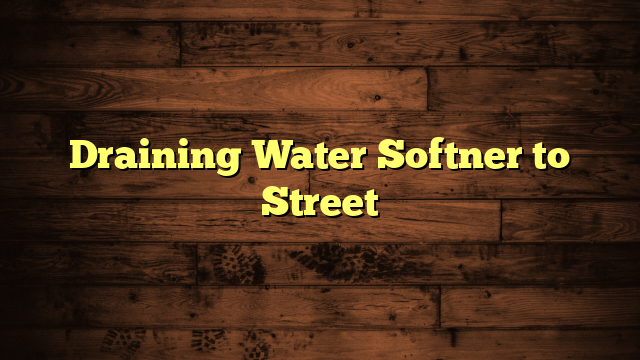Will White Vinegar Hurt My Water Softner?
When you consider cleaning, maintaining, and enhancing your water softener, you might wonder if white vinegar is a good choice. While it can effectively tackle mineral buildup, you should weigh the potential risks against the benefits. Prolonged use may lead to corrosion and damage, jeopardizing your softener's longevity. So, is the occasional use worth the risk, or are there safer alternatives that can achieve the same results? Understanding these nuances can help you make an informed decision for your home.
Key Takeaways
- White vinegar can effectively dissolve mineral buildup but may cause corrosion of water softener components over time.
- Long-term exposure to vinegar might damage resin beads, compromising the softener's performance.
- Using vinegar in moderation is crucial to avoid cumulative damage that leads to premature replacement.
- Alternatives like citric acid and baking soda are safer options for cleaning without the risks associated with vinegar.
- Following manufacturer guidelines for maintenance is essential to ensure the safe use of any cleaning agent.
Understanding Water Softeners
A water softener is a device designed to reduce hard minerals, like calcium and magnesium, in your water supply. These minerals can cause scale buildup in pipes and appliances, leading to decreased efficiency.
Understanding the different water softener types is essential for making an informed choice. The most common types include ion exchange, salt-free, and magnetic softeners. Ion exchange systems replace hard minerals with sodium ions, while salt-free systems use alternative methods to condition water without removing hardness. Magnetic softeners claim to alter mineral properties to prevent scaling.
When it comes to softener installation, you'll want to guarantee it's done correctly for peak performance. Many homeowners choose to hire professionals for installation, but if you're handy, you can tackle it yourself.
Make sure to follow the manufacturer's guidelines closely. Position the unit near your main water supply, and remember to connect it to a drain for regeneration cycles.
Maintaining your water softener is also essential. Regularly check the salt levels in salt-based systems and clean filters as needed.
The Role of White Vinegar
When it comes to maintaining your water softener, you might wonder about the role of white vinegar in the cleaning process. White vinegar is often considered a natural cleaning agent due to its acidity, which can help dissolve mineral buildup and other residues in your system. This is where vinegar benefits come into play, providing a simple and effective way to keep your softener running smoothly.
Using white vinegar can help remove scale and buildup without resorting to harsh chemicals. However, it's important to use it in moderation, as excessive vinegar can potentially lead to damage over time.
If you're looking for alternatives, vinegar alternatives like citric acid or baking soda can also be effective for cleaning purposes. These options can offer similar cleaning properties without the risks associated with overusing vinegar.
Ultimately, understanding the role of white vinegar in your water softener maintenance is vital. By recognizing its benefits and considering alternatives, you can make informed decisions about how to best care for your system without causing harm.
Always remember to follow manufacturer guidelines to guarantee your water softener stays in top condition.
Benefits of Using Vinegar
Using white vinegar in your water softener maintenance offers several benefits that can enhance its efficiency. Not only is it an effective cleaning alternative, but it also helps prolong the lifespan of your system.
Here's why you should consider incorporating vinegar into your routine:
- Cost-Effective: Vinegar is an inexpensive option compared to many commercial cleaners, allowing you to save money while maintaining your system.
- Natural Cleaning Power: As a natural product, vinegar doesn't introduce harsh chemicals into your water softener. This means you're keeping your system and the environment safe.
- Scale Reduction: Vinegar effectively breaks down mineral buildup, which can improve water flow and performance in your softener.
These vinegar benefits make it a fantastic choice for regular maintenance.
You'll find that by using white vinegar, you can easily achieve a cleaner and more efficient water softener without relying on potentially harmful commercial products.
Potential Risks Involved
Using white vinegar in your water softener can pose some risks you should be aware of.
It may corrode certain components over time, leading to costly repairs.
Additionally, there's a chance that the resin could get damaged, affecting the system's overall performance.
Corrosion of Components
Corrosion poses a significant risk to the components of your water softener, especially when exposed to substances like white vinegar.
Using vinegar can accelerate corrosion, compromising the overall integrity of your system. While it's important to maintain cleanliness in your water softener, you should prioritize corrosion prevention to guarantee long-lasting component durability.
Consider the following potential risks associated with corrosion:
- Pitting: This localized form of corrosion can create small holes in components, weakening them over time.
- Leaking: Corroded parts may lead to leaks, which can cause water damage and increased maintenance costs.
- Reduced Efficiency: Corroded components can hinder the softener's performance, leading to a less effective water treatment process.
To protect your water softener, it's wise to avoid using white vinegar and instead opt for cleaning solutions specifically designed for water softeners.
This proactive approach will help you maintain the durability of your system's components, ultimately saving you time and money on repairs.
Regular maintenance, combined with the right cleaning products, will go a long way in guaranteeing your water softener operates efficiently for years to come.
Resin Damage Risk
Exposing the resin beads in your water softener to white vinegar can lead to significant damage.
Vinegar's acidity can degrade the resin over time, reducing its lifespan and affecting its performance. When the resin beads break down, you'll notice a decrease in the water softener's ability to effectively remove hard minerals, which means you might start experiencing issues like scale buildup in your plumbing fixtures and appliances.
If you continue using white vinegar, you risk permanently damaging the resin, leading to costly replacements.
A compromised resin bed won't just affect how well your softener works; it can also result in higher water bills and inefficient water usage. You might think you're cleaning your system, but in reality, you're shortening the resin lifespan and diminishing its performance.
Expert Opinions on Vinegar
Many experts agree that while vinegar is a popular household cleaning agent, it can pose risks to water softeners. You might think that using vinegar is a safe and effective way to clean your system, but expert insights suggest otherwise.
Many vinegar misconceptions can lead to damage that's costly to fix.
Here are some key points experts want you to reflect on:
- Acidity Level: Vinegar's high acidity can degrade the resin beads in your softener, reducing its effectiveness.
- System Compatibility: Not all water softeners are designed to handle acidic substances, which can lead to malfunctions.
- Long-Term Effects: Regular use of vinegar may cause cumulative damage, leading to premature replacement of your unit.
It's essential to weigh the benefits of using vinegar against the potential risks.
If you're looking for a cleaning solution, it might be wise to consult your manufacturer or evaluate alternatives specifically designed for water softeners.
Ultimately, protecting your investment is vital, and understanding the expert opinions on vinegar will help you make an informed decision.
Alternative Cleaning Solutions
If you're looking for effective ways to clean your water softener without using vinegar, there are plenty of natural cleaning agents you can try.
Options like baking soda and citric acid can be chemical-free alternatives that still get the job done.
Exploring these solutions can help you maintain your system while keeping it safe and healthy.
Natural Cleaning Agents
Natural cleaning agents offer a safe and effective way to tackle everyday messes without the harsh chemicals found in many commercial products. By choosing these alternatives, you not only protect your health but also contribute to a cleaner environment.
Natural disinfectants, like vinegar and baking soda, can help you achieve a spotless home while being eco-friendly.
Here are three excellent natural cleaning agents you can easily incorporate into your routine:
- Vinegar: This versatile liquid is a powerful natural disinfectant that can cut through grease, remove odors, and even help with mold.
- Baking Soda: Known for its outstanding deodorizing properties, baking soda is an eco-friendly cleaner that can scrub surfaces without scratching them.
- Lemon Juice: This citrus wonder not only smells great but also acts as a natural disinfectant and stain remover, making it perfect for kitchen and bathroom cleaning.
Using these natural cleaning agents guarantees you're making a healthier choice for your family and the planet.
Chemical-Free Alternatives
When you're looking for effective cleaning solutions, consider the benefits of chemical-free alternatives that can keep your home fresh without harsh ingredients.
These eco-friendly solutions harness natural chemical properties to tackle grime and odors while being safe for your family and the environment.
For instance, baking soda is a versatile powerhouse. It absorbs odors, cleans surfaces, and even unclogs drains. Just sprinkle some on the area you want to clean, let it sit, and then scrub or rinse it away.
Another great option is lemon juice, which has antibacterial properties and helps cut through grease.
You can also create a simple all-purpose cleaner by mixing equal parts water and vinegar, although you'll want to verify it's safe for your specific surfaces, especially if you have a water softener.
Castile soap is another fantastic choice, as it's biodegradable and can be used on everything from dishes to floors.
Proper Maintenance Tips
Maintaining your water softener is vital for its longevity and efficiency. Regular water softener upkeep not only guarantees peak performance but also extends the life of your system.
To achieve this, it's important to establish a consistent maintenance schedule. Here are a few tips to keep in mind:
- Check salt levels: Verify your brine tank is filled with the appropriate amount of salt. Low salt levels can hinder regeneration and reduce efficiency.
- Clean the resin tank: Periodically remove any buildup or debris from the resin tank to maintain effective ion exchange.
- Test water hardness: Regularly test your water hardness to confirm your softener is functioning correctly. If hardness levels rise, it may indicate that your unit needs attention.
Final Thoughts on Vinegar Use
Using vinegar for cleaning can be a tempting option, but it's vital to understand its potential impact on your water softener. While vinegar is often praised for its natural cleaning properties, its acidity can lead to issues with the resin beads in your softener over time. You don't want to risk damaging this essential part of your system.
If you're looking for effective vinegar alternatives, consider options like baking soda or citric acid. These can provide similar cleaning benefits without endangering your water softener's performance. For instance, baking soda can tackle odors and stains, while citric acid is great for removing mineral deposits without the harsh effects of vinegar.
When exploring cleaning methods, always prioritize those that maintain the integrity of your appliances. Regular maintenance with gentler, non-acidic solutions will help guarantee your water softener operates effectively for years to come.
Frequently Asked Questions
Can I Use White Vinegar for Other Household Cleaning Tasks?
You can use white vinegar to clean kitchen surfaces and bathroom fixtures. It cuts through grime and disinfects, making it a great natural cleaner. Just remember to rinse well afterward for best results.
How Often Should I Clean My Water Softener?
You should clean your water softener every six months for ideal performance. Incorporate this cleaning frequency into your maintenance schedule to prevent buildup and guarantee your system runs efficiently, extending its lifespan and effectiveness.
Is There a Specific Vinegar Concentration to Use?
When cleaning, you should use a vinegar concentration of around 5% for ideal cleaning effectiveness. Higher concentrations can be too harsh, potentially damaging your appliances. Always dilute as needed to guarantee safety and efficiency.
What Signs Indicate My Water Softener Needs Cleaning?
If you notice hard water stains, reduced water flow, or increased soap usage, it's time for water softener maintenance. Regular cleaning every few months guarantees peak performance and longevity, keeping your system running smoothly.
Can I Mix Vinegar With Other Cleaning Agents?
You shouldn't mix vinegar with other cleaning agents, as it can create harmful reactions. For vinegar safety, stick to using it alone for cleaning effectiveness, ensuring you get the best results without risking any dangerous fumes.
Conclusion
To sum up, while white vinegar can be a tempting solution for cleaning your water softener, think twice before diving in. The short-term benefits might lure you in, but the long-term risks could haunt you. Will you take the chance of corrosion and costly repairs, or choose a safer alternative? It's your decision, but remember: what seems like a simple fix could lead to a bigger problem lurking just beneath the surface. Choose wisely!







